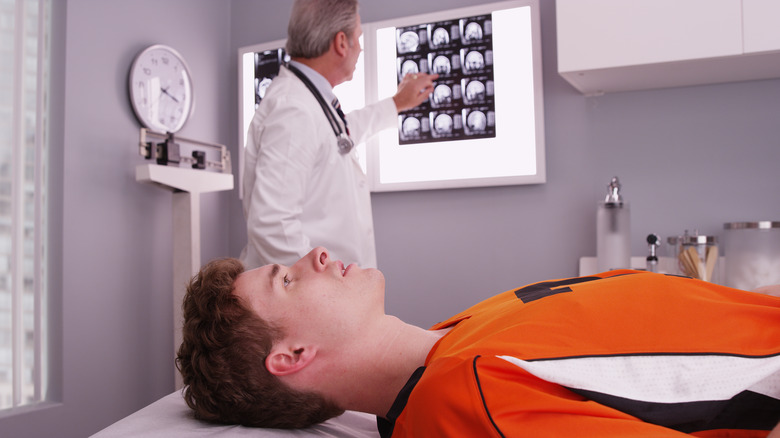Why Health Experts Suggest Concussion Diagnostic Testing Needs An Upgrade
A tool commonly used to diagnose sports-related concussions might not be as accurate as anticipated, according to researchers at Rutgers University. New research on the Standardized Concussion Assessment Tool (SCAT) has found that the questionnaire may be overestimating the occurrence of concussions in athletes by including symptoms caused by exertion (via ScienceDaily). Concussions are traumatic brain injuries that are often sustained from a blow to the head. While they're usually not life-threatening, they can potentially cause severe and long-lasting effects.
Upon assessing the symptoms and injuries of 209 rugby players, researchers discovered that players who had not sustained a head injury had many of the same symptoms as those had who had sustained a concussion. Some of these shared symptoms included fatigue and neck pain. However, rugby players who did have a concussion reported experiencing more symptoms than those who did not, reporting an average of up to 26 symptoms, including headaches and "not feeling right."
Exercising caution while diagnosing concussions
Researchers have stressed the importance of considering the effects of fatigue and physical exertion when assessing sports-related concussions. According to Stephanie Iring, a doctoral student in biomedical sciences at Rutgers University and the lead author of the study, medical professionals should exercise caution when using all of the symptoms listed on the diagnostic tool to evaluate whether or not someone has a concussion (via NorthJersey.com).
That's why it's important to watch out for symptoms that are more specific to head injuries, like confusion, dizziness, difficulty concentrating, memory problems, changes in mood, and hypersensitivity to light. In fact, Iring and her colleagues recently presented their findings at the annual meeting of the American Physiological Society. They advocated for further research on the matter in order to determine how SCAT and other physiological measures can be altered to more accurately assess sports-related concussions in athletes (via HealthDay News). This supports calls for a revision of the third version of SCAT, which is currently referred to for diagnoses.


